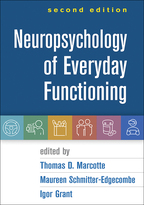Neuropsychology of Everyday Functioning
Second Edition
Edited by Thomas D. Marcotte, Maureen Schmitter-Edgecombe, and Igor Grant
Hardcovere-bookprint + e-book
Hardcover
orderMarch 15, 2022
ISBN 9781462548880
Price: $103.00598 Pages
Size: 7" x 10"
e-book
orderJanuary 18, 2022
PDF and Accessible ePub ?
Price: $103.00 598 Pages
ePub is Global Certified Accessible
print + e-book $206.00 $123.60
orderHardcover + e-Book (PDF and Accessible ePub) ?
Price: 598 Pages
ePub is Global Certified Accessible
Thomas D. Marcotte, PhD, is Professor in the Department of Psychiatry at the University of California, San Diego (UCSD), Co-Director of the Center for Medicinal Cannabis Research, and Program Manager of the HIV Neurobehavioral Research Program at UCSD. Dr. Marcotte’s research focuses on the development of methods for assessing and predicting the impact of cognitive impairments, as a result of substance use or neurological conditions, on the ability to carry out a broad range of everyday activities, in particular, driving an automobile. He has published numerous articles and book chapters on these topics and has served on the editorial boards of the Journal of the International Neuropsychological Society and Neuropsychology.
Maureen Schmitter-Edgecombe, PhD, is Regents Professor and H. L. Eastlick Distinguished Professor in the Department of Psychology at Washington State University. Dr. Schmitter-Edgecombe’s research focuses on investigating relationships between cognition and everyday functioning, and developing interventions and smart technologies to help delay functional disability and increase the quality of life of individuals with cognitive impairment. Her innovative interdisciplinary work with computer scientists and engineers has improved understanding of factors that can impact the ability to function independently and has led to the development of more ecologically valid assessment methods. She has published widely, serves on the editorial boards of leading neuropsychology journals, and has mentored many graduate students who are making significant contributions to the field.
Igor Grant, MD, is Mary Gilman Marston Distinguished Professor of Psychiatry and Director of the HIV Neurobehavioral Research Program and the Center for Medicinal Cannabis Research at the University of California, San Diego. Dr. Grant has contributed extensively to the literature on neuropsychiatry, in particular, on the effects of alcohol abuse, drug abuse, HIV, and other disease states on neurocognitive functioning and underlying brain disease. His work has also touched on the effects of life stress on health. He is founding editor of the Journal of the International Neuropsychological Society and AIDS and Behavior. He is a recipient of the Distinguished Lifetime Contribution to Neuropsychology Award and the Nelson Butters Award for research contributions to clinical neuropsychology from the National Academy of Neuropsychology.
Maureen Schmitter-Edgecombe, PhD, is Regents Professor and H. L. Eastlick Distinguished Professor in the Department of Psychology at Washington State University. Dr. Schmitter-Edgecombe’s research focuses on investigating relationships between cognition and everyday functioning, and developing interventions and smart technologies to help delay functional disability and increase the quality of life of individuals with cognitive impairment. Her innovative interdisciplinary work with computer scientists and engineers has improved understanding of factors that can impact the ability to function independently and has led to the development of more ecologically valid assessment methods. She has published widely, serves on the editorial boards of leading neuropsychology journals, and has mentored many graduate students who are making significant contributions to the field.
Igor Grant, MD, is Mary Gilman Marston Distinguished Professor of Psychiatry and Director of the HIV Neurobehavioral Research Program and the Center for Medicinal Cannabis Research at the University of California, San Diego. Dr. Grant has contributed extensively to the literature on neuropsychiatry, in particular, on the effects of alcohol abuse, drug abuse, HIV, and other disease states on neurocognitive functioning and underlying brain disease. His work has also touched on the effects of life stress on health. He is founding editor of the Journal of the International Neuropsychological Society and AIDS and Behavior. He is a recipient of the Distinguished Lifetime Contribution to Neuropsychology Award and the Nelson Butters Award for research contributions to clinical neuropsychology from the National Academy of Neuropsychology.



